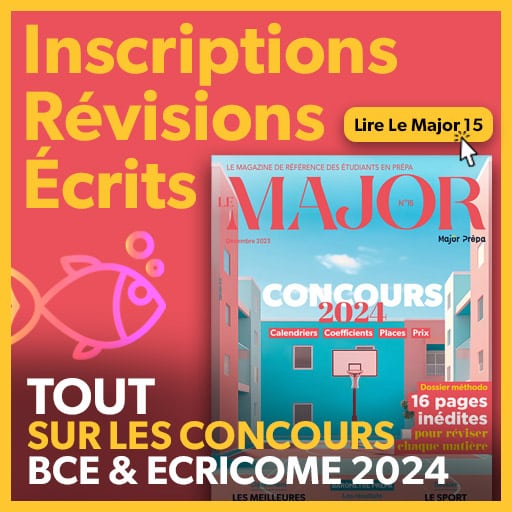Salut les prépas,
Si contrairement à vos prédécesseurs, vous avez de la chance et vous avez des oraux, il vous faudra ABSOLUMENT dead ça aux oraux de langues, parce que ce sont eux que vous aurez à passer, peu l’importe l’école dans laquelle vous serez admissibles ! Alors, pour vous aider, je vais vous proposer un petit sujet de colle commenté ! Allez, c’est parti !
Le texte : article du mercredi 6 septembre 2017, paru dans The Guardian et intitulé View on plastic: learning to love it wisely :
Our love for plastic is all-consuming. It is the irresistible wonder material: mouldable, inert, light and highly versatile, used not just in toys and toothbrushes but in pacemakers, teabags and spaceships. But this is a paradoxical relationship, and not a healthy one: we rely on it too much and value it too little, regarding it as cheap and disposable.
The cost is becoming obvious. Our planet is being buried under a mountain of plastic. Of the 8.3bn tonnes produced between the 1950s and 2015, four-fifths lies in landfill or in our natural environment. Once we marvelled at plastic’s durability; now we lament the centuries it takes to decompose. The impact on our oceans, our landscapes and our wildlife is undeniable. But far from reversing course, we are accelerating: we have made roughly as much plastic since 2000 as we did in all the years before.
It is not only out there: it is in here. The Guardian has revealed that microplastic contamination has been found in tap water samples from around the world: the Orb Media investigation found that 94% of samples from the US were contaminated, and even in European nations, which had the lowest rate, 72% were affected. Other research has found tiny pieces of plastic in seafood, and fibres in the air in people’s homes.
We do not know how this affects our health. But we do know that there is good reason to be concerned. Experts fear the spread of plastic nanoparticles, so minute that they could be able to penetrate our organs. They warn too that studies show microplastics can attract bacteria found in sewage, and toxic chemicals which they release into the bodies of wild animals. Why should we imagine that we will be immune?
Last year, the environmental audit committee urged the government to draw up a research strategy on microplastic pollution, prioritising human health impacts and ways to reduce pollution. In-depth work is needed on where microplastics come from; how they get into food and water, and in what quantities; and whether they remain in our bodies and leach chemicals into our guts or affect other organs.
We cannot afford to wait for the results as we watch plastic take over our planet. Use in Asia is surging: China accounts for more than a quarter of global demand for polyethylene terephthalate bottles. In many parts of the world, clean drinking water means bottled water. Even in the UK, consumers cannot avoid plastics if we try. The vogue for zero-waste grocery stores, where customers bring their own containers and weigh out what they want, is likely to remain a niche one. Consumers are an important part of the story, but a relatively small one.
Government action will be required to push resistant industry into the changes needed, both in Britain and abroad. Most plastic is recyclable; but less than a 10th of that produced is actually recycled. So the Scottish government’s announcement of a deposit return scheme for drinks containers is welcome. In Norway and other European countries, taxes are used to incentivise businesses to meet recycling targets.
Even that is just a start in changing our mindset so that we design items with their end already in mind. The Ellen MacArthur Foundation and World Economic Forum produced a striking portrait of a new plastics economy, where the materials do not end up as waste. That means wider use of reusable packaging, a radical increase in recycling and greater adoption of industrially compostable plastic packaging.
The real problem is not plastic: it’s us. We need not reject the wonder material, but instead regain our sense of wonder, learning to treat it as a treasure instead of trash.
Preparatory work when reading the text
Focus on the title
The Guardian view –> an editorial = journalists, authors, the newspaper editorial board express their views according to the political, economic, environmental line of their newspaper.
The title is an illustration of the authors’ opinion: rephrase it to make sure you know where the authors stand on the topic: people use plastic excessively. They should learn how to use it with care.
The title points to the hidden problems related to today’s overuse of plastic. The material is used to our detriment instead of being used to our benefit.
Introduction
Possible Catchphrases
Plastic is the most commonly used material today but it is used excessively and dangerously. While some are campaigning for its ban, others, like the Guardian journalists, are advocating a moderate use of the material. Plastic used to be hailed as the key material to make practically anything. Today it is reviled as one of the main sources of pollution, especially when thrown away in the ocean. Where should we strike the right balance between these two extreme views? The authors offer a wise compromise: let’s consume it with care and caution. The seventh continent exists and it is made of plastic garbage causing a lot of environmental damage to marine wildlife. To combat this scourge, the authors recommend using the material wisely.
Key elements to be found in your summary
Plastic is an extraordinary material but people have an unhealthy relationship with it/signs of its misuse can be noticed on the planet/the world can no longer get rid of plastic waste mountains/more damage is now caused to the environment as plastic consumption has kept increasing since the beginning of the 21st century and all over the planet/damage is also caused to human health through food and water contamination/there is an urgent need for extensive research to understand plastic-related health risks/Yet, action is needed before the results are published: consumers must reduce plastic consumption but more efficient action must come from government as it should encourage plastic recycling, for instance/eventually, as often, the problem is not the material but our consumption of it./Plastic must be seen as a rare, precious material that should be used with care.
Transition
Using plastic wisely, as the Guardian recommends, should be today’s economic and environmental motto. The issue of plastic linked to the wider issue of environmental activisrn and politics and the text raises the following question: who should act most to achieve the sustainable development of our most precious resources: how can we reconcile the economic benefits of plastic without damaging the planet and how can sustainable development be achieved best?
Commentary
DO NOT FOCUS ON PLASTIC ONLY. PROPOSING AN OUTLINE LIKE: 1- PLASTIC IS A WONDER MATERIAL/2- PLASTIC IS A POLLUTING MATERIAL/IS UNACCEPTABLE.
Government legislation is the most influential step towards a better use of plastic or other polluting elements:
Argument:
Forcing the industry to adapt to new consuming habits is essential and government legislation should be passed to reach that goal
Example:
Banning plastic straws and cups and opting for reusable cups, as British Environmental Secretary Michael Gove did, may be a symbolic measure but it certainly is a step in the right direction to address the issue of plastic over-consumption.
Argument:
Spurred on by government legislation, the industry to find innovative ways to use other less polluting materials than plastic
Example:
Reducing packaging and developing bio-plastic: A growing number of entrepreneurs and researchers are working to turn foods like mushrooms and tomato peels into edible replacements for plastics, coatings and other packaging materials. Their efforts come as food and beverage companies are also looking for biodegradable containers -Nestle Waters and Danone recently announced a joint project to make water bottles from wood.
Comparative argument:
The use of diesel in cars can provide a mode of action. Only when governn1ents took drastic steps to prevent diesel cars from driving, did the car industry really invest in producing more fuel-efficient cars and did drivers transition to other fuel for their vehicles. The boom of electric or hybrid cars is the result of government restrictive measures on this particular field.
Government legislation is therefore decisive as it, alone, can talk economic forces into changing their producing habits. Taxation is another weapon.
Argument:
A carbon tax imposed on all companies that use carbon excessively was never imposed because it was extremely unpopular. Yet, a similar tax could be imposed on all the companies that use plastic indiscriminately. However unpopular, it will certainly encourage companies to be innovative to find alternatives to plastic. Yet, this political action often meets political resistance, as seen with the caarbon tax or with the environmental measures taken by the Obama administration and repealed by the Trump administration, bent on bringing back king coal into the economy.
This resistance is also ideologically motivated as Naomi KIein pointed out in her essay in 2014: “This changes everything: capitalism vs climate change”. Changing consumption habits is an ideological decision that goes against the capitalist drive to consume ever more. Consuming wisely is anti-capitalistic.
That’s why, complementing government action, consumers have a decisive role to play in achieving sustainable development on the planet.
Examples:
Movements like “zero waste” have had knock-on effects on extravagant consuming habits and raised awareness on people’s overuse of materials like plastic. Zero waste is no longer a subcultural fringe movement. Indeed, in the past 20 or so years, major US cities have set goals to be trash-free. Back in 2001, Oakland, California, established a zero-waste goal. San Francisco is also aiming to be zero- waste by 2020. New York City aims to send substantially less waste to landfills by 2030.
Recycling, reusing goods has become a new normal in many countries encouraging the development
of a circular economy. Recycling goods is however not enough if little is done with that recycling. In January 2018, China stopped accepting contaminated recycling from other countries. This was the result of a fouryear plan to encourage its domestic recycling market to start buying up its own domestic product and become self-sufficient. It also encouraged neighboring countries, like Australia, to do tbe same. Finally, recyding of materials like glass can be almost entirely reused all over the planet.
Counter-argument: this, however, remains marginal as the economic system remains based on producing and consuming more:
Example: Another obstacle to these changing consuming habits is online shopping. Buying goods has never been so easy on Amazon and lots of consumers are going on shopping sprees online for goods tbey don’t even need and end up being dumped in landfills.
Conclusion
Plastic is not evil in itself but the waste it causes is. Education and awareness campaigns must make people realize that consuming habits are harmful to their budgets, to their health and to the planet . Living on the planet’s resources in a sustainable way should be the result of combined efforts from all stakeholders (the government, the industry/the business world and the public).











